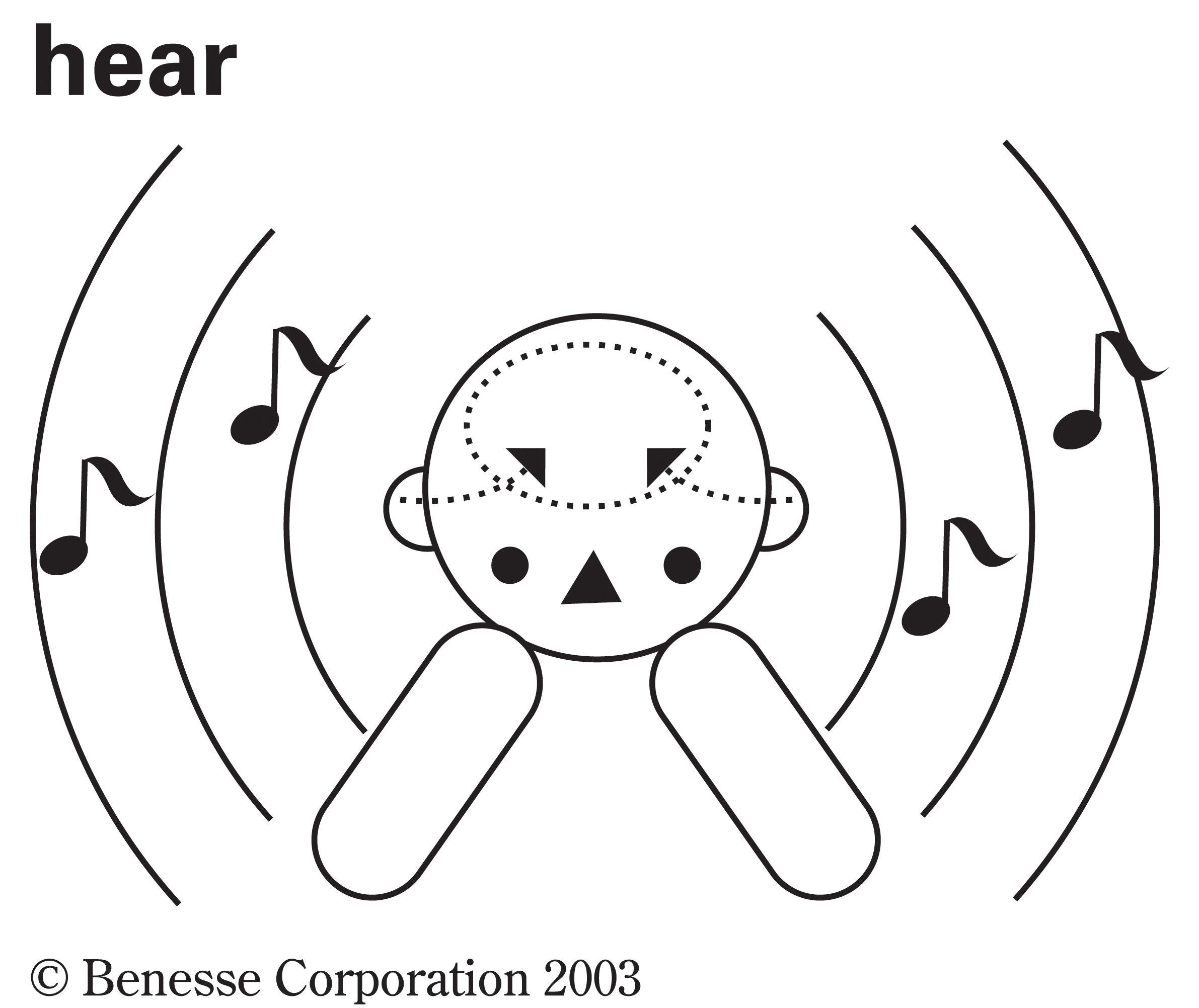hearとは 意味・読み方・使い方
追加できません
(登録数上限)
意味・対訳 (…が)聞こえる、(…を)聞く、聞き知る、聞かされている、話に聞く、(うわさに)聞いている、伝え聞く、(…が)(話に)聞いている、(…を)よく聞く、(…に)耳を傾ける
| 覚え方 |

|
(聴覚器官が機能して)聞こえる⇒listen |
hearの |
hearの |
|
hearの |
hearの学習レベル | レベル:1英検:3級以上の単語学校レベル:中学以上の水準TOEIC® L&Rスコア:220点以上の単語 |
研究社 新英和中辞典での「hear」の意味 |
|
hear
1
a
〈…が〉聞こえる,〈…を〉聞く 《★【類語】 listen (to) は意識的に耳を傾けて聞く》.
He didn't hear what I said. 彼は私の言うことが聞こえなかった. You hear me! 聞いたとおりだ, そのとおりだ. I've heard that one before! それは前に聞いたことがある, 信じないね 《言い訳に対する返事に言う》. |
b
〔+目的語+原形〕〈…が〉〈…するのが〉聞こえる.
I heard somebody cry out. だれかが大声で叫んだのが聞こえた 《★【用法】 受身では不定詞に to を用いる: Somebody was heard to cry out.》. |
c
〔+目的語+doing〕〈…が〉〈…しているのが〉聞こえる.
He heard branches moving as the wind grew stronger. 風が強くなった時木の枝が動いている音が聞こえた. A bird was heard singing. 鳥が歌っているのが聞こえた. |
d
〔+目的語+過去分詞〕〈…が〉〈…されるのが〉聞こえる.
She heard her name called. 彼女は自分の名前が呼ばれるのを耳にした. |
2
a
〈ニュースなどを〉聞き知る,聞かされている,話に聞く.
We haven't yet heard any news of the event. その事件についてはまだ何のニュースも聞いていません. Nothing has been heard of him since. (それ以来)全然彼の消息を聞かない (cf. hear 自動詞 2c). |
b
〔+(that)〕〈…ということを〉(うわさに)聞いている,伝え聞く.
I'm sorry to hear [I hear with regret] that your mother is ill. お母様がご病気だそうでお気の毒に存じます. “He's going to resign."—“So I hear." 「彼は辞職するそうだ」「そんな話だね」 《★【用法】 この so は前文を受けたもので that 節の代用》. |
c
〔+目的語+過去分詞〕〈…が〉〈…されるのを〉(話に)聞いている.
I once heard it said that we are never so happy or unhappy as we suppose. 我々は決して自分が想像しているほど幸福でもなければ不幸でもないのだと言われるのを聞いたことがある. |
3
a
〈…を〉よく聞く,〈…に〉耳を傾ける 《★【比較】 この意味では listen to のほうが一般的》.
Let's hear his explanation. 彼の説明を聞こう. |
b
〈講演・演奏などを〉聞きに行く; 傍聴[聴講]する.
hear a lecture 講義を聞く. |
c
【法律, 法学】〈事件などを〉審問[審理]する.
Which judge heard the case? どの裁判官が事件を審理しましたか. |
4
〈祈りなどを〉聞いてやる,聞き入れる.
Lord, hear my prayer. 主よ, わが願いを聞き入れたまえ. |
1
(耳が)聞こえる.
He doesn't hear well. 彼は耳がよく聞こえない 《★【比較】 He doesn't listen well. 彼は人の話をよく聞かない》. |
2
〔+前置詞+(代)名詞〕
a
〔…から〕便り[通信,連絡]がある 〔from〕《★受身可》.
Haven't you heard from him since you came here? こちらへ来られてからまだ彼から便り[電話, 連絡]がないのですか. |
b
〔…の存在[事実]を〕聞いて知っている 〔of〕《★受身可》.
I've heard of him, but I haven't met him. 彼のことは聞いて知ってはいるが会ったことはない. I've never heard of such a thing. そんな事は今までに聞いたためしがない. I've never heard of (their [them]) reneging on an agreement. (彼らが)協定を破るなんて聞いたことがない. |
c
〔…のことを〕聞いている,〔…の〕消息を聞く 〔of〕《★受身可》.
I've heard much of him. 彼のことをいろいろ聞いている (cf. hear 他動詞 2a). He's never been heard of since. それ以来全然彼の消息を聞かない. Have you heard of him recently? 最近彼の消息を聞いていますか. |
d
〔…について〕聞いている; 〔…の〕消息を聞く 〔about〕.
Have you heard about him? 彼の(あの)ことを聞きましたか. |
3
[命令法で] 《主に英国で用いられる》 聞け,謹聴.
Hear! Hear! [しばしば反語的に用いて] 謹聴!, 賛成!, ヒヤヒヤ! |
| héar óut | hèar téll [《主に英国で用いられる》 sáy] 《口語》 |
| màke onesèlf héard | wòn't [wòuldn't] héar of… |
法律のほかの用語一覧
-
履歴機能
 過去に調べた
過去に調べた
単語を確認! -
語彙力診断
 診断回数が
診断回数が
増える! -
マイ単語帳
 便利な
便利な
学習機能付き! -
マイ例文帳
 文章で
文章で
単語を理解! -

Eゲイト英和辞典での「hear」の意味 |
|
hear
覚え方(聴覚器官が機能して)聞こえる⇒listen
 |
他動詞
2…を(うわさなどで)耳にする,伝え聞く;〈…ということを[…かを]〉聞く〈that節[wh‐節]〉(通例進行形にはできない)
3(人の意見など)を(じっくり)聞く;〈…かを〉聞く〈wh‐節〉
4(事件など)を審理する,(公式に)じっくり聴く
5(願いなど)を聞き届ける
6(ミサなど)に出席する
自動詞
成句hear about ...
…について聞く
成句hear from ...
…から連絡がある,便りをもらう
成句hear of ...
①…のこと[うわさ]を聞く
②…を聞き入れる(通例否定文で用い,will, wouldを伴う)
成句hear| |out
(人)の話を最後まで聞く
成句cannot hear| oneself |think
(騒々しくて)集中できない,考えることができない
成句Do you hear (me)?
私の言うことを聞いていますか(命令形の後で念を押していう)
成句Hear! Hear!
賛成!賛成!(議会など正式な場面で用いる)
成句hear ... on [through] the grapevine
⇒grapevine成句
成句hear say [tell] of ... [that ...]
((米口))…を[…と]話[うわさ]に聞く
成句hear things
⇒thing成句
成句make| oneself |heard
自分の声を聞かせる;考えを聞いてもらう
Weblio実用英語辞典での「hear」の意味 |
|
hear
「hear」とは・「hear」の意味
「hear」は、音が耳に届く、あるいは意識的に何かの音や言葉を聞く行為を指す動詞である。
hearの用法
動詞
聞く、耳にする、聞き取る、傾聴する、聞こえる「hear」が動詞として使われる場合、耳に音が届く自然な感覚を表すほか、意識して情報を受け取る行為を示す。具体的な例を以下に示す。
・例文1. Did you hear that noise?(あの音が聞こえた?)
2. I heard someone calling my name.(誰かが私の名前を呼んでいるのを聞いた。)
3. She heard the news on the radio.(彼女はラジオでそのニュースを耳にした。)
4. The teacher asked the students to hear her out.(先生は生徒たちに最後まで話を聞くように頼んだ。)
5. He heard a whisper in the dark room.(彼は暗い部屋でささやき声を聞き取った。)
コア・セオリー英語表現(基本動詞)での「hear」の意味 |
|
hear
| コアとなる意味 | (聴覚器官が機能して)...を聞く |
| ポイント | 「耳を傾ける」のlistenと比較. |
- My grandmother doesn't hear very well.
祖母は耳がよく聞こえない
- "Tommy, can you hear me?" "Yes, I can hear you."
(電話で)「トミー, 聞こえるかい?」「うん, 聞こえるよ」
(→Do you hear me?は相手に対して怒っているときに使うことが多い) - The room was so quiet you could hear a pin drop.
部屋はしーんとしていたので針が落ちても聞こえるほどだった - I heard [could hear] my father snoring in the other room.
父が別室でいびきをかいているのが聞こえた - She was heard going out.
彼女は出かけるのを聞かれた - He didn't hear his name called.
彼は自分の名が呼ばれるのが聞こえなかった
- I'm glad to hear that you've finally got a new job.
君が新しい仕事を得たと聞いて嬉しいよ - I hear that Barns has resigned as principal.
バーンズは校長を辞任したと聞いた - When Ned heard who was speaking at the conference, he decided not to go.
ネッドは会議で誰が話すのかを聞いて行かないことに決めた - I haven't heard anything of Vera lately; maybe she's still in Mexico.
ベラのことは最近何も聞かない,多分彼女はまだメキシコにいるのだろう - Have you heard the one about the traveling salesman and the farmer's daughter?
旅のセールスマンと農夫の娘のことは聞いたかい? - I've heard that one before.
またあの話か
- Yesterday I heard the teacher explain what our class project would be.
昨日私は先生が私たちの授業プロジェクトがどのようなものかという説明を聞いた - First, hear what they have got to say, and then make your decision.
最初に彼らの言い分を聞いてそれから決断しなさい - I hear what you're saying, but I'm afraid I can't permit you to have your way.
君の言っていることは分かるが, 私は君のやり方を許すわけにはいかないと思う
「hear」を含む例文一覧
該当件数 : 4575件
|
|
|
|
hearのページの著作権
英和辞典
情報提供元は
参加元一覧
にて確認できます。
| Copyright (c) 1995-2024 Kenkyusha Co., Ltd. All rights reserved. | |
| Copyright © Benesse Holdings, Inc. All rights reserved. | |
| Copyright (C) 2024 田中茂範 All rights reserved. | |
| © 2000 - 2024 Hyper Dictionary, All rights reserved | |
| ※この記事は「日本法令外国語訳データベースシステム」の2010年1月現在の情報を転載しております。 | |
| Copyright (C) 2024 ライフサイエンス辞書プロジェクト | |
|
日本語ワードネット1.1版 (C) 情報通信研究機構, 2009-2010 License All rights reserved. WordNet 3.0 Copyright 2006 by Princeton University. All rights reserved. License |
|
| Copyright(C)2002-2024 National Institute of Information and Communications Technology. All Rights Reserved. | |
|
Copyright (C) 1994- Nichigai Associates, Inc., All rights reserved. 「斎藤和英大辞典」斎藤秀三郎著、日外アソシエーツ辞書編集部編 |
|
| CMUdict | CMUdict is Copyright (C) 1993-2008 by Carnegie Mellon University. |
ピン留めアイコンをクリックすると単語とその意味を画面の右側に残しておくことができます。 |
|
ログイン |
Weblio会員(無料)になると
|
weblioのその他のサービス
|
ログイン |
Weblio会員(無料)になると
|
